Star Trek Second Season
Original air dates: September 1967 – March 1968
Executive Producer: Gene Roddenberry
Producer (to “Journey to Babel”): Gene L. Coon
Producer (from “Bread and Circuses”): John Meredyth Lucas
Captain’s log. Where the first season had the show finding its way and figuring out what worked and what didn’t—one moment an ensemble, the next a showcase for the guest star of the week (a common mode of dramas of the time), the next a three-lead show—by season two, it had pretty much settled into a three-lead show.
We still got hints of the ensemble (moments in “Obsession” and “The Trouble with Tribbles” in particular), and occasionally the guest star became the focus of the episode (again “Obsession,” as well as “Metamorphosis,” “The Ultimate Computer,” and naturally “Assignment: Earth“), but mostly they were pretty well settled in the formula of Kirk, Spock, and McCoy beam down to a planet and have adventures. In fact, that formula was so well-liked by the end of the previous season that DeForest Kelley was elevated to the opening credits to reflect his equal role as part of the triad atop the series, and proving his mettle particularly in “Friday’s Child,” “Amok Time,” “Bread and Circuses,” “Journey to Babel,” “A Private Little War,” “The Immunity Syndrome,” “The Ultimate Computer,” and especially “Return to Tomorrow.”
The notion of the Klingons as recurring antagonists takes root in this season as well, as that enemy empire appears in three episodes. (The Romulans also make a return appearance in “The Deadly Years,” but no Romulans are actually seen, and their role is secondary.)
Perhaps of greatest import, however, is the recognition of Spock as the breakout character. The episode that sent Spock back to his home planet, “Amok Time,” was deliberately aired as the season premiere to take advantage of the character’s popularity, and besides his abortive wedding in that episode, we also meet his parents in “Journey to Babel,” and Leonard Nimoy gets several opportunities to break character, not only with Spock’s pon farr in “Amok Time,” but also with his evil, goatée’d counterpart in “Mirror, Mirror,” his humorous role-playing in “I, Mudd” and “A Piece of the Action,” and being possessed by Henoch in “Return to Tomorrow.”
Highest-rated episode: A tie between two of the most iconic episodes of the entire franchise, “Mirror, Mirror” and “The Trouble with Tribbles,” the season’s only two 10s. Honorable mention to the two 9s, “Amok Time” and “The Doomsday Machine.”
Lowest-rated episode: “The Omega Glory” with a much-deserved 0.
Most comments (as of this writing): “Obsession,” the only episode to reach three figures in comments with 108. Not entirely sure why, but there it is.
Fewest comments (as of this writing): “Return to Tomorrow” with only 22. Risk may be our business, but I guess commenting about it isn’t…
Favorite Can’t we just reverse the polarity? From “The Immunity Syndrome“: The space amoeba is eleven thousand miles long, width varying from two to three thousand miles, its outer layer is studded with space debris and waste, while the interior consists of protoplasm. That’s a big Twinkie….
Favorite Fascinating. From “Metamorphosis“: When Spock shows off his disruptor he says, “It cannot fail.” He then activates it and it totally fails.
Favorite I’m a doctor not an escalator. From “Return to Tomorrow“: McCoy is against the plan from jump because of the physical consequences to the crew’s bodies as well as the other attendant risks, and his refusal to go along with Thalassa’s rather awful plan is a crowning moment of awesome matched only by his standing up to Khan.
Favorite Ahead warp one, aye. From “The Deadly Years“: Sulu was good enough to be left in command in combat against the Gorn and against the Klingons in “Arena” and “Errand of Mercy,” respectively, in the latter case during a declared state of war, so it’s unclear why Stocker can’t just put him in charge after Kirk’s declared incompetent. It’s even less clear as the battle against the Romulans rages on and Stocker keeps asking Sulu for advice.
Favorite Hailing frequencies open. From “The Deadly Years“: Uhura gets the best line of the episode when Stocker asks her to let him know if they contact any Romulan ships. The ship is hit with weapons fire a second later, and Uhura dryly says, “I think we just made contact, sir.”
Favorite I cannot change the laws of physics! From “By Any Other Name“: Scotty gets Tomar drunk. At one point, he pulls out a drink and is too swozzled to remember what it is, so he drunkenly identifies the libation to Tomar: “It’s green.” This scene will be echoed when James Doohan guest stars as Scotty on TNG‘s “Relics” when Data serves an unlabeled bottle to Scotty and can only say that, “It is green.”
Favorite It’s a Russian invention. From “Friday’s Child“: As with McCoy, so too with Chekov: we get the source of the navigator’s category as he claims that “fool me once, shame on you; fool me twice, shame on me” is actually a saying from Russia. His silly smile after he says it indicates that he knows he’s full of shit, a level of self-awareness of his own foolishness he will abandon before too long….
Favorite Go put on a red shirt. From “The Omega Glory“: Poor Galloway gets attacked by the Yangs and then Tracey shoots him like he’s an injured horse being put out of his misery. Kirk barely even notices that he’s been shot. (Hell, Kirk mispronounces his last name as “Galway”—perhaps mixing him up with another doomed crewmember whose death had no obvious effect on him—at the top of the episode.)
Favorite No sex, please, we’re Starfleet: From “Who Mourns for Adonais?” Palamas gets the best line of the episode, when she rejects Apollo, asking, “Is that the secret of your power over women? The thunderbolts you throw?” Wah-HEY!
Favorite Channel open. From “Friday’s Child“: “How did you arrange to touch her, Bones? Give her a happy pill?”
“No, a right cross.”
Kirk advocating drugging a pregnant woman, while McCoy expresses his preference for violence against pregnant women.
Favorite Welcome aboard. Some very memorable guest stars in this season: Julie Newmar, elevating the Capellan people out of stereotype territory by the power of her own awesomeness as Eleen in “Friday’s Child.” Michael Forest, nailing the role of Apollo despite having to wear a doofy toga in “Who Mourns for Adonais?” Celia Lovsky, bringing huge swaths of gravitas to the role of T’Pau, and Arlene Martel, bringing a quiet steel to the role of T’Pring, in “Amok Time.” William Windom totally inhabiting Decker and his PTSD in “The Doomsday Machine.” Roger C. Carmel is magnificently hilarious in his return engagement as the title character in “I, Mudd.” Reggie Nadler brings a supreme dignity to the role of Shras in “Journey to Babel.” Joseph Ruskin continues to have the best voice ever in his first of many Trek roles as Galt in “The Gamesters of Triskelion.” Anthony Caruso and Vic Tayback are delightfully gruff as gangsters Oxmyx and Krako in “A Piece of the Action.” William Marshall brings his overwhelming presence to the role of Daystrom in “The Ultimate Computer.” And Robert Lansing and Teri Garr make you long for the spinoff that never was in “Assignment: Earth.”
All by itself, “The Trouble with Tribbles” is a cornucopia of great guest casting, as we get William Schallert, William Campbell, Whit Bissell, Charlie Brill, Michael Pataki, Guy Raymond, and the great Stanley Adams.
But the big guests of the season are Mark Lenard and Jane Wyatt, providing the iconic roles of Spock’s parents, Sarek and Amanda, in “Journey to Babel.”
Favorite Trivial matters: A tough choice—there’s the one for “Mirror, Mirror,” there’s the one for “Journey to Babel,” there’s the one for “Amok Time,” and there’s the one for “Assignment: Earth,” all episodes that had long reaches beyond their hours…
To boldly go. “Live long and prosper.” It’s funny, I always thought of the second season as the pinnacle of the original series, but that was mostly due to the sheer power of the season’s four finest episodes, “Mirror, Mirror,” “The Trouble with Tribbles,” “The Doomsday Machine,” and “Amok Time,” not to mention important episodes like “Metamorphosis” and “The Deadly Years” and “Journey to Babel” and “Assignment: Earth.” So many elements of the franchise that would continue to recur throughout the movies and the spinoff series and the tie-in fiction were established in those eight episodes.
The series embraced all-out comedy to a greater degree than it did in the first season, which gave us not only one of the two episodes generally regarded as the show’s finest (“Tribbles“), but also the delightful romps of “I, Mudd” and “A Piece of the Action.”
But actually watching the episodes again week after week, I’m appalled with how incredibly weak the season is. For starters, there’s all the truly horrible episodes, starting with “Catspaw” at the top of the season and going all the way to the low point of Trek to date in “The Omega Glory.” There’s silly stuff like the Roman episode and the Nazi episode. Worse, we have episodes like “The Apple” and especially “The Gamesters of Triskelion.” Whenever people make fun of Star Trek or want to demean it in some way, it’s as likely as not that they’re referring to something that came from one of these two awful episodes, from the former’s systematic murder of every redshirt (while the rest of the cast emerges wholly unscathed, including characters who suffer the same kind of attack) to the latter’s seduction of a buxom green-haired woman in a skimpy silver outfit.
Worse, though, is that there is almost none of the humanism, the compassion, of the first season. The theme throughout season one was that there are no monsters, only people of different types. But the second season is almost all monsters, from the extragalactic creeps in “Catspaw” to the titular “Doomsday Machine” to Redjac in “Wolf in the Fold” to Nomad in “The Changeling” to Vaal in “The Apple” to the giant amoeba in “The Immunity Syndrome” to the cloud creature in “Obsession.” The exceptions—the giant floating omelette in “Metamorphosis,” the Kelvans in “By Any Other Name“—are few and far between. The Enterprise spends way too much time defeating enemies and not enough time seeking out new life and new civilizations.
Still, one can’t deny the importance of the season’s high points, and it makes slogging through the (many more) low points worth the trouble.
Warp factor rating for the season: 6
Next week: “Spectre of the Gun”
Keith R.A. DeCandido‘s X-Files short story “Back in El Paso My Life Will Be Worthless” in Trust No One was nominated for a Scribe Award for Best Short Story by the International Association of Media Tie-in Writers. (Also nominated in the Best Speculative Novel category were the Trek novels TNG: Armageddon’s Arrow by Dayton Ward and Seekers: Long Shot by David Mack.) The winners will be announced at Comic-Con International in San Diego in July.










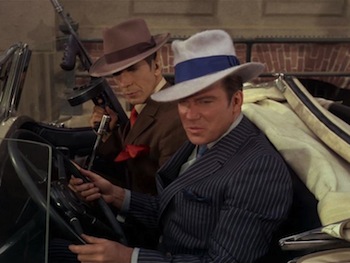
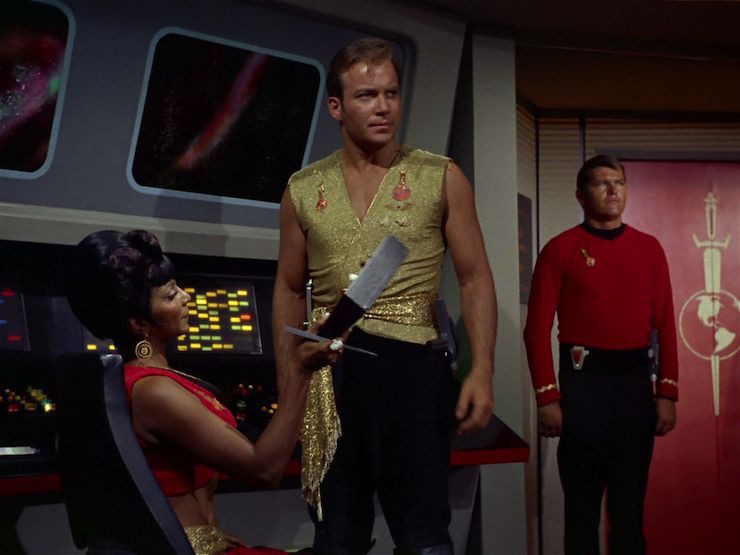
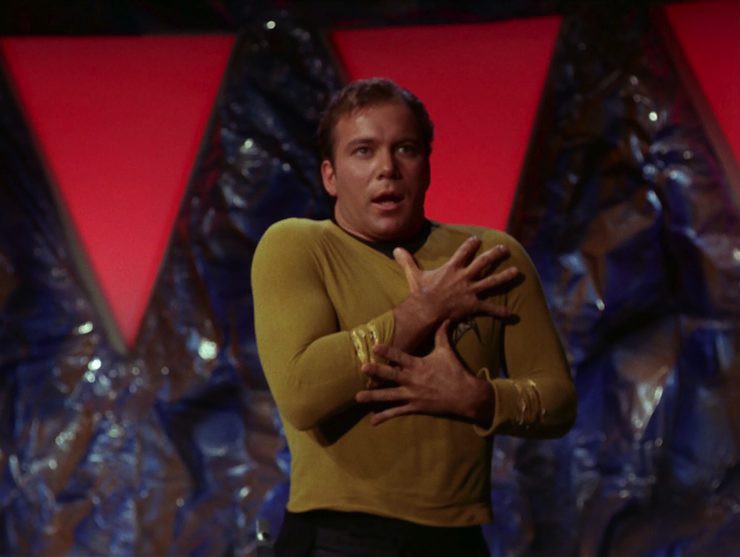
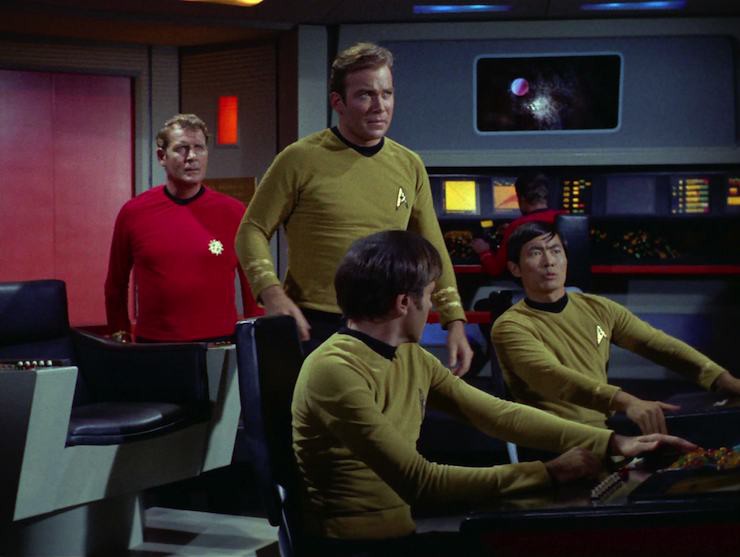
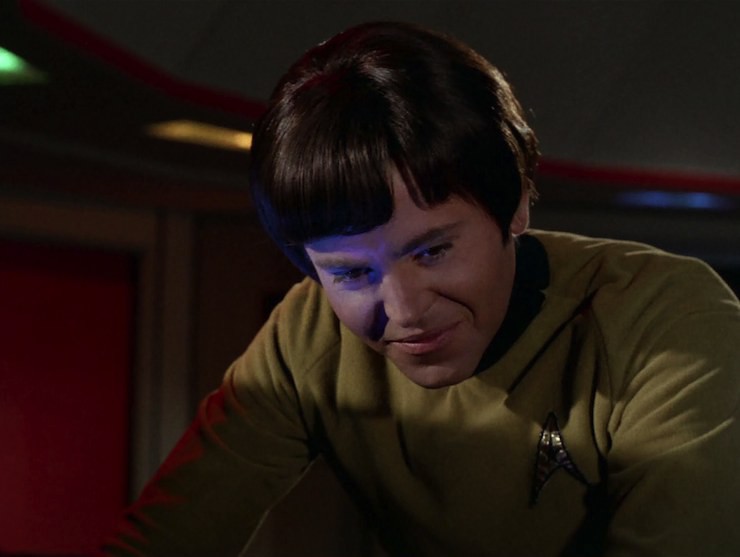
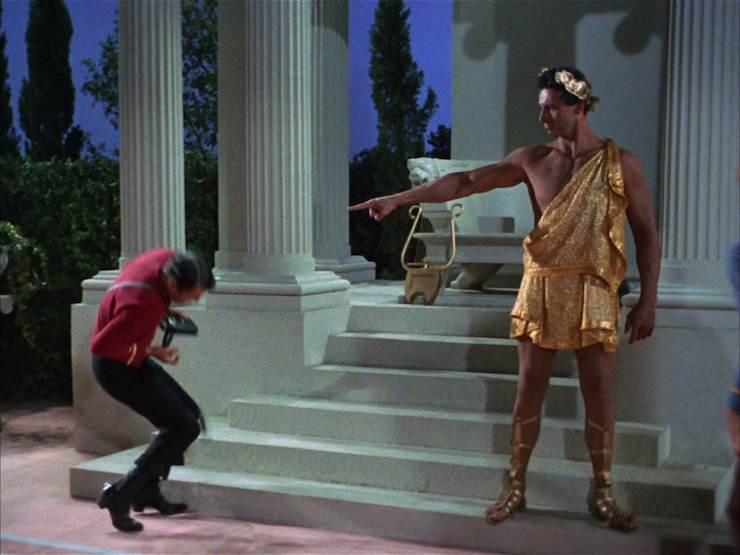
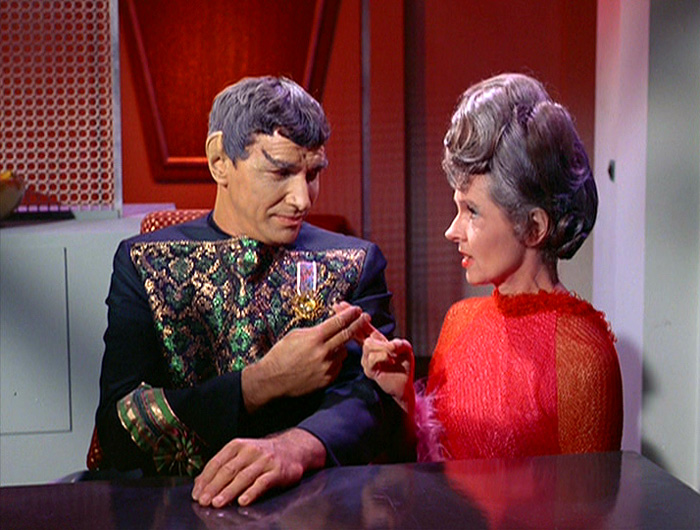
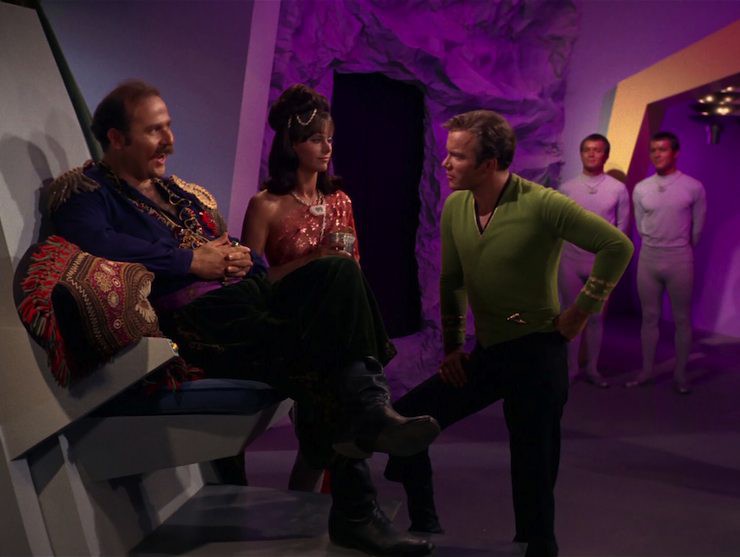
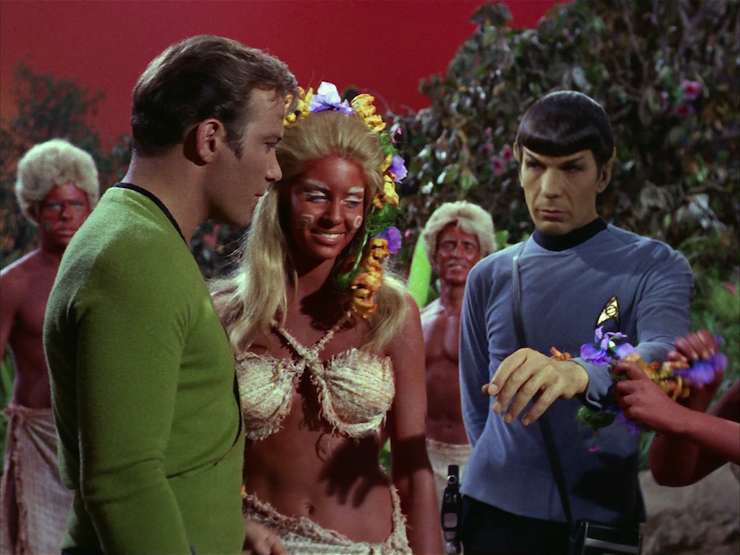
Typo watch: Shras’s actor is Reggie Nalder, not Nadler.
Interesting overview. I hadn’t realized it, but you’re right about the season’s trend toward simpler monster-fighting stories. I tend to think of Star Trek as a franchise that tends to present violence more as a cause of problems than a solution, but many of this season’s episodes are resolved by shooting them a lot or blowing them up real good. (Or beaming them into space, which is the solution in two consecutive episodes, “Wolf in the Fold” and “The Changeling.” Never noticed their proximity before.)
On the other hand, there are still a number of episodes where the characters save the day by outsmarting the problem rather than outshooting it, even if some of them are silly episodes like “Triskelion.” So it’s not a total loss.
I think that in a lot of ways, this season moved away from the naturalism and maturity that the first season aspired to. Kirk is less a vulnerable everyman and more a conventional two-fisted, womanizing ’60s action hero, there’s less everyday slice-of-life stuff among the crew, etc. It’s a trend that will continue in season 3.
If the theme of season one is that there are no monsters, and season two is all about monsters, then the theme of upcoming season three is “Space is very unhealthy”, with quite a few episodes featuring space plagues/diseases and the search for various cures.
If anything, I think season 2’s downward trend reflects a bit of behind-the-scenes turmoil. Fact of the matter is Gene L. Coon supposedly had a breakdown midway through that year, Despite John Meredyth Lucas being a very competent showrunner, the Coon episodes still reflected that trend. To me, it’s clear case of a talented writer burning himself out creatively.
And I think season 3 supports even more that assumption. Coon wrote both Spock’s Brain and Spectre of the Gun, plus a couple of other underwhelming s3 entries. The way I see it, A Piece of the Action was really Coon’s last hurrah. I’m sure he pushed for the comedy, the silliness, and eventually lost sight of season 1’s strongest elements. And Roddenberry went along with it.
All they had was Roddenberry, Coon and Fontana. No wonder TV shows would eventually create writers’ rooms. You can’t do 26 shows, and be able to revise 26 full-length scripts within a year (many of them freelance assignments) with only 3 people on staff and hope to maintain that quality and consistency.
It’s a good thing they found talented writers like Norman Spinrad, David Gerrold and Jerome Bixby. Their episodes really stood out and made the season better as a whole. Overall, it was still enjoyable and there were times they were capable of reaching the heights set in that first season. Metamorphosis was a personal favorite of mine, and one of Coon’s best efforts.
Also, I did enjoy the music a lot more this season. I found it to be better written and more nuanced.
When I rewatched all of TOS a year ago, I was surprised how many bad episodes there are in the second season, but I’ve noticed only recently how different the three seasons are. Where the first season has anti-war stories, human colonies, ex-lovers and a few romances for the main characters, the second season has cold war stories, Earth-parallel cultures, more Vulcans, more Klingons, comedies and Kirk seducing alien enemy women (although that got started in “What Are Little Girls Made Of?”). The third season has lots of romances and fairytales.
One nice development in the second season is that the galaxy has become less human-centric – we see less Earth colonies, more alien worlds and all the ambassadors in “Journey to Babel”, and we hear about a starship with a Vulcan crew.
@eduardo Jencarelli — it was even worse than that, as Trek did 29 episodes in the first and second seasons. Also, I’m not sure that having a writer’s room and an expansive staff helps all shows — many live and die on the quality of the staffers, which has been a bit of a problem with the Berlantiverse, as the rookies are of highly variable quality and the veterans are being moved around to the new shows; that continues even now, despite there being no new Berlantiverse show on the horizon for the moment. A strong showrunner can be the difference, something we may see in the upcoming Star Trek series.
If I remember it correctly, the music in the second (and third) season was an improvement over the first by dint of them using more people and having more original scores written, rather than resorting (as many shows did in the 1950s and 1960s) to library music. Heavy hitters such as Jerry Fielding got to stretch themselves a bit more, and some of those cues have since become quite iconic. There’s quite a contrast between the underscore for TOS and the comparatively weak underscore work done for TNG; even the movies really only have the Goldsmith scores to shout about, and even with Goldsmith we have the half-heartedness of the Nemesis score (which might be due to Goldsmith turning over a chunk of the score to his son, Joel.)
For some reason I keep thinking that “The Gamesters Of Triskelion” is the one with the giant pink dildo, but, of course, it’s not, as I only recently rewatched that episode (“What Are Little Girls Made Of”) and my rewatch is only partway into the first season.
@5/StevenEMcDonald: Actually there were 26 episodes in the second season. If you leave out the pilots, which were shot separately, then the first season had either 28 or 29 episodes depending on how you count “The Menagerie.” For some reason, it’s the only Trek two-parter that’s only assigned one episode number. Perhaps that’s because about half of it was the recycled pilot, or maybe because they expanded a single scheduled production block into a 2-parter to catch up on the shooting schedule. Anyway, there’s a pretty consistent downward trend in season lengths — 28(ish) in the first, 26 in the second, 24 in the third. (And 22 animated episodes, although that’s a 16-episode first season and a 6-episode second season.) Probably a result of the budget getting cut each year.
As for the number of original scores per season, they’re about the same. The pilots and first season together contain 13 scores, with full scores (20-35 minutes) for 9 episodes (the pilots, Mudd’s Women, The Enemy Within, The Man Trap, The Naked Time, Charlie X, Conscience of the King, Shore Leave) and partial scores (5-10 minutes) for 4 episodes (Corbomite Maneuver, Balance of Terror, Little Girls…, City on the Edge…), plus several minutes of general library cues by Joseph Mullendore and Wilbur Hatch, all based on Courage’s main theme. The second season also had 13 episodes with original scoring, but only 6 full scores (for the first six produced episodes), 5 partial scores between 10-20 minutes (Mirror, Mirror, By Any Other Name, I, Mudd, Tribbles, Return to Tomorrow), and 2 score fragments (Patterns of Force, Omega Glory), plus a few minutes of original library music by Alexander Courage and a couple of bits of Gerald Fried source music that were recorded but unused. So the second season actually had less original music in total. It did have more composers, though. The first season had five (Courage, Fred Steiner, Sol Kaplan, Fried, and Mullendore) and the second had seven (Courage, Steiner, Kaplan, Fried, George Duning, Jerry Fielding, and Samuel Matlovsky).
The third season, by the way, had 9 full original scores (for the first 8 produced episodes and “Plato’s Stepchildren”) and 4 episodes with brief bits of source music — the Orion dance in “Whom Gods Destroy,” the space-hippie songs in “The Way to Eden,” the Brahms paraphrase in “Requiem for Methuselah,” and the presidential fanfare in “The Savage Curtain.” So it still technically adds up to 13 episodes with new music, and the total amount is probably at least equal to season 2. It had no original library music, though, just re-recordings of cues from earlier seasons. It had five main composers (Courage, Steiner, Fried, Duning, Fielding), plus several composers for the various bits of source music.
And those ’50s shows you mention tended to use library music that wasn’t written specfically for them — either borrowed from earlier shows or from stock libraries created for general use. TOS never used any cues that weren’t composed or performed specifically for it.
Joel Goldsmith did not work on the Nemesis score. His one Trek movie contribution as a composer was for First Contact, although he worked on the sound effects team of ST:TMP.
The best Trek scores have been Jerry Goldsmith’s. To me, the best aspect of Final Frontier is the score. Nemesis, flaws aside, I find its score to be very underrated. It takes repeated viewings to really appreciate the work that went towards it.
Yes, but I’m fairly certain that multiple viewings of Nemesis is a violation of the Geneva Convention.
—Keith R.A. DeCandido
@8/krad: You could just listen repeatedly to the soundtrack album. I agree with Eduardo that Goldsmith’s Nemesis score is underrated. (Although I also think the movie as a whole is underrated, just with a couple of glaring flaws.)
Heck, my second-favorite Goldsmith movie score (after TMP) is for Rambo: First Blood Part 2, a movie I don’t like at all but whose soundtrack I’ve owned for decades (since before I ever saw the movie, in fact). So there’s no reason a score can’t be enjoyed apart from its movie.
Its good to see a little love for Nemesis. They tried to make it something it shouldn’t have been (a revenge movie similar to Wrath of Kahn), but it does have some good stuff in it. Still in the bottom three Trek movies for this guy though.